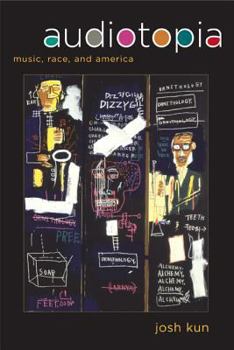Audiotopia: Music, Race, and America Volume 18
(Book #18 in the American Crossroads Series)
Select Format
Select Condition 
Book Overview
Ranging from Los Angeles to Havana to the Bronx to the U.S.-Mexico border and from klezmer to hip hop to Latin rock, this groundbreaking book injects popular music into contemporary debates over American identity. Josh Kun insists that America is not a single chorus of many voices folded into one, but rather various republics of sound that represent multiple stories of racial and ethnic difference. To this end he covers a range of music and listeners to evoke the ways that popular sounds have expanded our idea of American culture and American identity. Artists as diverse as The Weavers, Caf Tacuba, Mickey Katz, Rahsaan Roland Kirk, Bessie Smith, and Ozomatli reveal that the song of America is endlessly hybrid, heterogeneous, and enriching-a source of comfort and strength for populations who have been taught that their lives do not matter. Kun melds studies of individual musicians with studies of painters such as Jean-Michel Basquiat and of writers such as Walt Whitman, James Baldwin, and Langston Hughes. There is no history of race in the Americas that is not a history of popular music, Kun claims. Inviting readers to listen closely and critically, Audiotopia forges a new understanding of sound that will stoke debates about music, race, identity, and culture for many years to come.
Format:Paperback
Language:English
ISBN:0520244249
ISBN13:9780520244245
Release Date:November 2005
Publisher:University of California Press
Length:319 Pages
Weight:2.30 lbs.
Dimensions:0.8" x 6.1" x 9.1"
Customer Reviews
2 ratings
Superb!
Published by Thriftbooks.com User , 16 years ago
This is a superb example of what I would call the "new American Studies," written from a self-conscious, self-reflective Jewish position that branches out to engage and include other identities, cultures, and milieus in a fundamentally new way of looking at America, as an "audiotopia" as yet unfulfilled. It takes seriously the notion that black and latin musics are the lingua franca of a new universal community in America. What distinguishes this book is its superb and unpredictable readings of several key personalities in American Culture. The chapter on Jean Michel Basquiat and his relation to '80s music is worth the price of the book alone. Another is his profound examination of James Baldwin's relationship to the blues, Bessie Smith, and how both allowed Baldwin to explore his black and gay self in new and profound ways. Kun's discussion of rock en espanol shows how musical border crossings may be the most active challenges to the hyper nationalism in 21st century United States and Mexico. Rather than tendentious, the writing is some of the most exciting academic writing I have read in years. This is a rewarding explanation of why music remains an "audiotopia" for so many Americans.
an illuminating discussion of race and popular music
Published by Thriftbooks.com User , 18 years ago
*Audiotopia* takes on a difficult question: if we tell the history of America through its popular music, what does the country look like (or, should we say, sound like)? Kun's answer is that music is one of the most multicultural parts of American culture, able to evoke 'audiotopias' through the clash and fusion of different musical idioms. The audiotopia of Ozomatli, for instance, suggests that the various communities that produced salsa, ranchera, reggae, ska, and funk might not be so far apart in the end -- a hopeful vision that contrasts with the real-life segregation of communities in America. While some parts of the book (e.g., the section on James Baldwin) do have a more academic ring, the sections on music are written with verve and a canny sense of the *sound* of the music. For my money, Kun is more alive to the beautiful strangeness of Roland Kirk's music than anyone else I've read on the saxophonist. And his affectionate reconsideration of the career of Mickey Katz -- a clarinetist who mixed Spike Jones absurdities, klezmer tunes, and Catskills-like Jewish humor -- is wonderful too. On a final note, I would add that I teach the history of popular music on the college level and have recommended the book to undergraduates doing research papers on various kinds of contemporary music. In several cases, the students have told me that the book helped them think in new ways about the special cultural space that music can create -- that it helped them understand why they felt so attached to some kinds of music and the worlds they felt invited into.





